World Geography And Politics Daily News | 22 Jun 2023

Views (86)
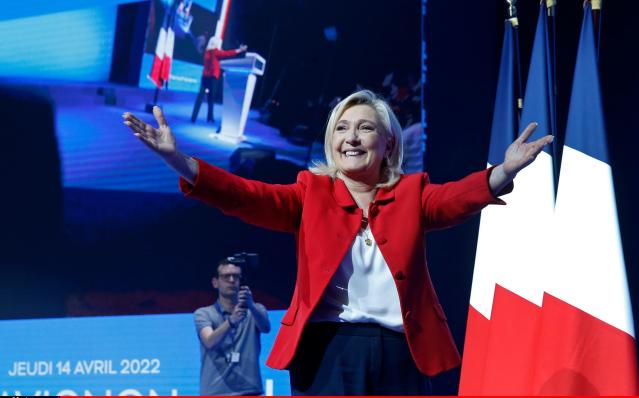
Putin is not ready for peace: actions speak louder than words – US State Department
The United States does not believe that Russian President Vladimir Putin, whatever he says, is really disposed towards peace talks to end the war in Ukraine, since he continues to bombard cities and civilians.
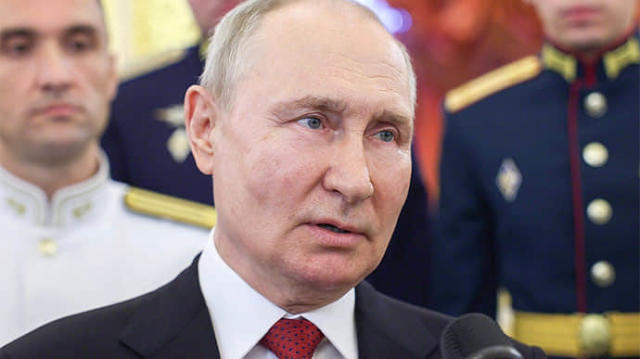
The United States does not believe that Russian President Vladimir Putin, whatever he says, is really disposed towards peace talks to end the war in Ukraine, since he continues to bombard cities and civilians.
Details: During the briefing, the State Department spokesman was asked about the visit by African leaders to Ukraine and Russia, as well as a statement Putin made during a meeting with them in which he said Moscow had not refused to engage in peace talks.
Quote: "Russia continues to show no meaningful interest in ending this war, which is clear from the fact that the African leaders spent hours in bomb shelters while Russia continued to bombard Ukraine during their visit," Patel said.
Patel stressed that in this case "actions speak louder than words".
"President Putin says a lot of things, I will leave it up to you all to interpret how many of them are true or not. Again, it is quite clear in Russia’s actions – bombarding Kyiv, targeting civilian infrastructure, targeting energy infrastructure, targeting apartment buildings, targeting hospitals – that they show no meaningful interest in determining peace and ending this war," the State Department representative added.
Putin even showed the African leaders an initialled draft agreement with Ukraine that was prepared in Istanbul in March 2022, ignoring the fact that the delegations from both sides were not authorised to conclude any such agreement.
Beijing, Washington trade barbs after Biden labels China's Xi a 'dictator'
The State Department clapped back at remarks issued by China's Foreign Ministry after it took issue with President Biden calling Chinese President Xi Jinping a "dictator."
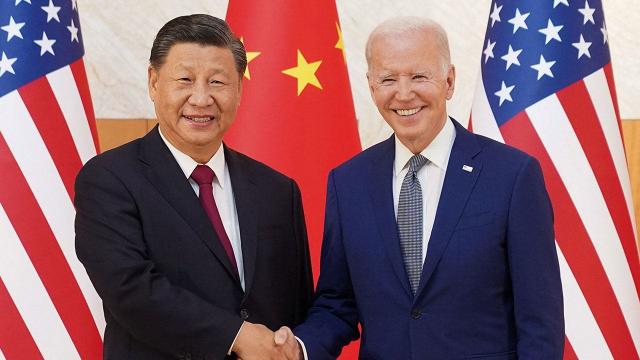
"That’s a great embarrassment for dictators, when they didn't know what happened," he continued. "That wasn’t supposed to be going where it was."
Biden said the balloon was "blown off course" as it traveled down through the U.S.
"And he didn't know about it. When it got shot down, he was very embarrassed. He denied it was even there," Biden added.
Chinese Foreign Ministry spokesperson Mao Ning responded to the comments Wednesday morning and accused Biden of a "blatant political provocation," calling his comments "absurd" and "irresponsible."
"China expresses strong dissatisfaction and opposition," Mao said, adding that Biden’s comments "go totally against facts and seriously violate diplomatic protocol, and severely infringe on China’s political dignity."
"However, the U.S. distorted facts and used forces to hype up the incident, fully revealing its nature of bullying and hegemony," she added.
Patel backed the president’s comments and told reporters that "it should come as no surprise that we have differences and disagreements with the [People’s Republic of China] PRC."
Patel said the U.S. would continue to engage with China through diplomatic and "responsible" means to "manage tensions and clear up misperceptions."
"That does not mean, of course, we will not be blunt and forthright about our difference," he added.
NATO wants to fight climate change. Its chief tells AP the trick is to make armies green but strong
NATO faces a series of dilemmas in its attempts to fight climate change while ensuring the effectiveness of its combat forces, as Europe’s biggest land war in decades ravages Ukraine, the head of the military alliance told The Associated Press in an interview on Wednesday. The main dilemma NATO is contending with, Secretary-General Jens Stoltenberg said, is the difficult choice “between either having a green or a strong military."
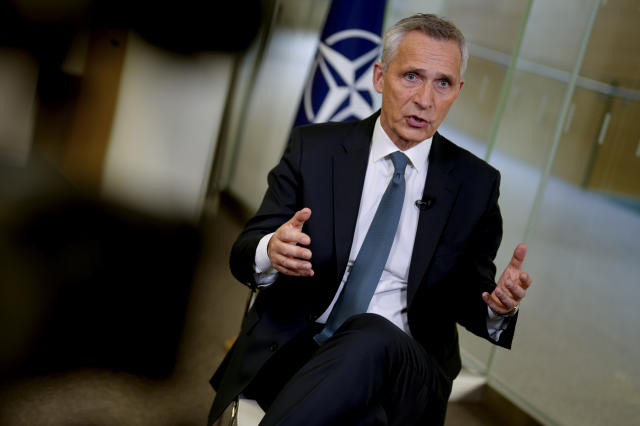
BRUSSELS (AP) — NATO faces a series of dilemmas in its attempts to fight climate change while ensuring the effectiveness of its combat forces, as Europe’s biggest land war in decades ravages Ukraine, the head of the military alliance told The Associated Press in an interview on Wednesday.
The world’s armed forces are among the greatest consumers of hydrocarbons – fuel and oil – that contribute to greenhouse gases. They have been in much demand recently as global warming fans conflicts and crises because of resource and food scarcity.
The main dilemma NATO is contending with, Secretary-General Jens Stoltenberg said, is the difficult choice “between either having a green or a strong military."
He said that NATO needs to "reconcile the need for an effective, strong, armed forces with the need to have climate-friendly armed forces.”
Last year, in its new Strategic Concept – essentially NATO’s mission statement – the world’s biggest security organization recognized, for the first time, climate change as “a defining challenge of our time, with a profound impact on Allied security.”
The document acknowledged that the 31-nation alliance’s “infrastructure, assets and bases are vulnerable to its effects.” It warned that NATO armies are being forced to operate in more extreme climate conditions and are increasingly called upon to take part in disaster relief operations.
“Climate change is a crisis multiplier. It increases competition over scarce resources like water and land, and it drives millions of people to leave their country. So, all this impacts our security,” Stoltenberg told the AP at NATO's headquarters in Brussels.
Last week, NATO began an air deployment exercise in Germany billed as the biggest in the alliance’s history. Some 250 aircraft – a major source of emissions – from 25 nations responded to a simulated attack on a NATO member. The United States alone sent about 100 aircraft.
The exercise was long-planned, but remains part of NATO’s deterrence and defense strategy; its ongoing effort to dissuade Russian President Vladimir Putin from expanding his war against Ukraine to any member of the alliance. Wargames are not likely to be halted.
Stoltenberg said that the best way to achieve a balance is “to develop technology and to ensure that the armed forces are part of the energy transition which is going on.” NATO has established an “innovation fund” and a center for excellence on climate change to help develop such technology.
The United Kingdom has also begun to use more climate-friendly fuels, biofuels, for some of its aircraft. Other allies are working on ways to reduce their dependency on diesel, which is also particularly vulnerable to air or land attacks when being transported.
But Stoltenberg said that NATO cannot simply “go 100% from fossil technologies to zero-emission technologies in one stroke.” That raises another dilemma.
“Over time we will have parallel systems that will increase costs and there will be additional problems with logistics,” when it comes to supplying motors, battle tanks and ships with different kinds of fuels and parts, he said.
“The other dilemma (is) to make sure that the systems can work together,” Stoltenberg said. “If different nations (use) different systems that are partly fossil and partly new technologies, then the issue of the interchangeability and interoperability will be even harder.”
The fight against climate change has, in some ways, been postponed by the heavy reliance of many European countries on Russia for oil and natural gas before it invaded Ukraine last year. Some, like Poland, are slowing their transition away from coal, while others, such as Belgium, plan to keep using nuclear energy for longer.
Stoltenberg warned that nations must be wary of creating new dependencies, notably on authoritarian countries like China, for rare earth minerals like lithium and cobalt used in the manufacture of batteries and solar panels and windmills.
Security though is at the heart of the battle against climate change, Stoltenberg told the AP, and peace is a precondition for that, whether in Ukraine or elsewhere.
We need peace and stability, he said, so countries can cooperate among themselves and incur a meaningful global effort to reduce emissions.
“If allies or Ukraine were forced to choose between a climate-friendly or an effective armed force, then everyone would choose a strong and effective military because that’s about our security,” he said. The challenge, Stoltenberg underlined “is to reconcile, those two goals in the long run.”
Israeli police clash with Druze protesters in the Golan Heights. The rare violence leaves 20 injured
Israeli police on Wednesday fired tear gas, sponge-tipped bullets and a water cannon during mass demonstrations by Druze Arabs in the Golan Heights — a rare burst of violence in the normally quiet area. Thousands of Druze residents of the Golan took part in the demonstrations against the construction of massive wind turbines.
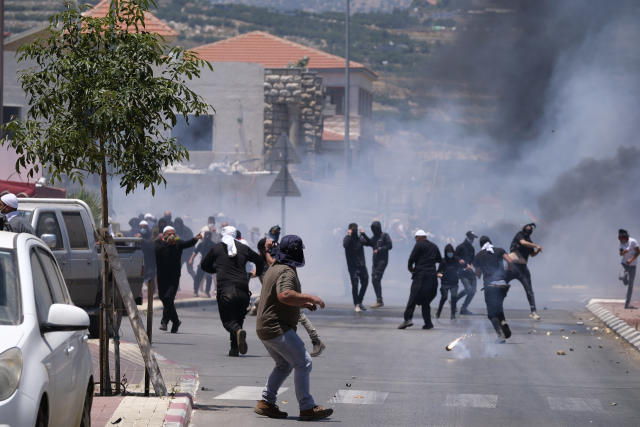
JERUSALEM (AP) — Israeli police on Wednesday fired tear gas, sponge-tipped bullets and a water cannon during mass demonstrations by Druze Arabs in the Golan Heights — a rare burst of violence in the normally quiet area. At least 20 people were reported injured.
Thousands of Druze residents of the Golan took part in the demonstrations against the construction of massive wind turbines. The windswept area is an ideal spot for the turbines, but residents fear damage to their properties and landowners have said they did not understand the agreements they signed with a local power company, according to Israeli media.
Israeli police said a large crowd attempted to storm a police position in the town of Masade, throwing stones, fireworks, setting tires on fire, vandalizing police cars, blocking roads and even shooting live fire into the air.
A video released by police showed the crowd pelting riot police with objects.
The video showed Israeli riot police, accompanied by a large armored vehicle equipped with a water cannon, marching through the streets, firing tear gas. The sound of rapid gunfire is heard in the background.
Israel’s Ziv Hospital reported 20 injuries — including 12 members of the police with light wounds and eight civilians, four of whom were in serious condition.
Israel captured the Golan, a strategic plateau overlooking northern Israel, from Syria in the 1967 Mideast war. It subsequently annexed the area in a move that was recognized by former President Donald Trump. But most of the international community considers the area to be occupied territory.
While Druze leaders still profess allegiance to Syria, relations with Israel are normally good. The Golan is a popular vacation destination for Israelis and is filled with hotels and restaurants, and most residents speak Hebrew fluently. Violent clashes with Israeli authorities are rare.
Prime Minister Benjamin Netanyahu's office said he met with a Druze spiritual leader on Wednesday afternoon as officials tried to defuse the situation.
“I view with great severity and concern what is happening at the moment on the Golan Heights,” he said.
China slams Biden for equating Xi to 'dictators'
China's foreign ministry on Wednesday slammed comments by US President Joe Biden equating Chinese leader Xi Jinping with "dictators" as an "open political provocation"."The relevant remarks by the US side are extremely ridiculous and irresponsible, they seriously violate basic facts, diplomatic protocol and China's political dignity," foreign ministry spokeswoman Mao Ning said at a Wednesday briefing.
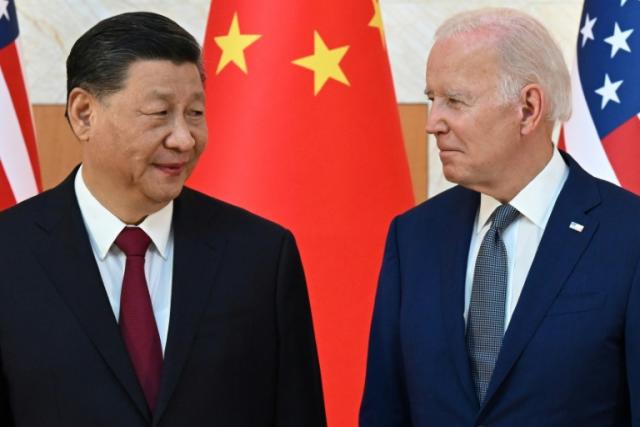
China's foreign ministry on Wednesday slammed comments by US President Joe Biden equating Chinese leader Xi Jinping with "dictators" as an "open political provocation".
Speaking at a fundraiser in California on Tuesday, Biden said Xi had been angered over an incident in February when a Chinese balloon -– which Washington says was used for spying -– flew over the United States before being shot down by American military jets.
His comments come just days after US Secretary of State Antony Blinken concluded a visit to Beijing aimed at re-establishing lines of communication in order to avoid conflict between the two global powers.
"The reason why Xi Jinping got very upset in terms of when I shot that balloon down with two box cars full of spy equipment is he didn't know it was there," Biden said.
"I'm serious. That was the great embarrassment for dictators, when they didn't know what happened."
Beijing's foreign ministry termed Biden's comments as "ridiculous".
"The relevant remarks by the US side are extremely ridiculous and irresponsible, they seriously violate basic facts, diplomatic protocol and China's political dignity," foreign ministry spokeswoman Mao Ning said at a Wednesday briefing.
"China is strongly dissatisfied with and firmly opposed to this," she added.
The White House tried to ease tensions later on Wednesday, saying Blinken "made some progress" during his trip to China and that Washington still had "every expectation of building on that progress."
"Diplomacy, including that undertaken by Secretary Blinken, is the responsible way to manage tensions," a senior administration official said, adding "it should come as no surprise that the president speaks candidly about China and the differences that we have."
- 'Distortion of facts' -
The multi-faceted rivalry between China and the United States turned into a full-blown diplomatic crisis with February's balloon incident.
Beijing on Wednesday reiterated its protest against Washington's decision to shoot it down.
"The United States should have dealt with it calmly, rationally and professionally, but its distortion of facts, abuse of force, and escalation of hype have fully exposed its hegemonic and bullying nature," Mao said.
Russia also criticised Biden's comments, with the Kremlin on Wednesday saying the comment reflected Washington's "unpredictable" foreign policy.
"This is a very contradictory manifestation of US foreign policy, which points to a significant element of unpredictability," Kremlin spokesman Dmitry Peskov told reporters.
- 'Going to take time' -
Biden, who at 80 is running for re-election, on Tuesday told donors that "we're in a situation now where (Xi) wants to have a relationship again."
Blinken "did a good job" on his Beijing trip, but "it's going to take time," Biden added.
The US president also brought up another prickly point regarding China: a recent summit in which leaders of Australia, India, Japan and the United States -- known as the Quad group -- sought to boost peace and stability in the Asia-Pacific maritime region.
The four countries are "working hand in glove in the South China Sea and the Indian Ocean," Biden said.
"What he (Xi) was really upset about was that I insisted that we unite the... so-called Quad," Biden said.
Tuesday was not the first time Biden has made significant, even provocative, statements at fund-raising receptions -- usually small-scale events at which cameras and recordings are forbidden but where journalists may listen to and transcribe the president's opening remarks.
At one such event last October Biden spoke of the threat of nuclear "Armageddon" from Russia.
burs-aue-mlm-oho/je/aha/mtp/md/des
Britain’s Right will soon be clamouring to rejoin the EU – and the Left will be defending Brexit
The attitude you have towards Brexit and the EU is one of the clearest indicators of where you stand politically. If you are a Remainer who regrets Brexit and wants to rejoin the Single Market or even the EU then you are almost certainly on the centre to Left of the political spectrum. If however you were an ardent Leaver and still support Brexit even if disappointed with the failure to take advantage of it, then you are fairly sure to be on the Right. There are clearly some exceptions – such a
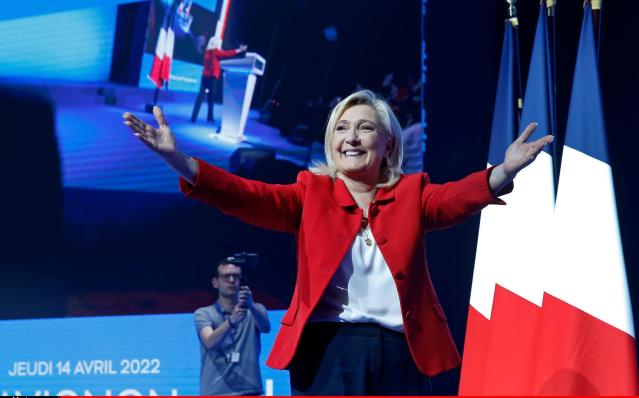
The attitude you have towards Brexit and the EU is one of the clearest indicators of where you stand politically. If you are a Remainer who regrets Brexit and wants to rejoin the Single Market or even the EU then you are almost certainly on the centre to Left of the political spectrum. If however you were an ardent Leaver and still support Brexit even if disappointed with the failure to take advantage of it, then you are fairly sure to be on the Right. There are clearly some exceptions – such as the few advocates of Lexit, including Mick Lynch – but the general rule holds.
This is because Brexit stands as a proxy roughly speaking for a range of views on other issues, notably migration, and shows where you stand on the increasingly dominant issue in politics, that of nationalism versus globalism and traditional identity versus self-definition. The liberal cosmopolitans identify their views with the EU and their opponents’ with Brexit. History suggests that this state of affairs may not be permanent.
It is hard to imagine now but at one time support for leaving the EEC (as it then was) was a defining Left-wing position while the Right (including people like Mrs Thatcher) were strongly in favour of closer links with Europe. It was Thatcher who championed the European Single Market. In 1983 leaving the EEC was a central part of the Labour Party’s programme, while anti-EEC Conservatives were a small and scattered remnant – rather like today’s Lexiteers.
All this changed between roughly 1987 and 1993. Conservatives became increasingly sceptical or even hostile towards the European project as they became aware of the goal of closer union it had since its emergence in the 1950s. The Left came to see the EU as the bulwark for its values of social liberalism and an interventionist form of market economy. A sudden swap of positions happened.
Something similar could happen over the next decade. The liberal Left will fall out of love with European politics and become alienated from the direction the EU is taking. The Right meanwhile will become more attracted to them and will see the EU as the best vehicle for realising its goals. Supporting rejoining will become a Right-wing or even far Right cause while opposing this and supporting closer links with the US will be the Left.
The other factor is the transformation of the British Right by culture wars politics. Increasingly the Right is defined by opposition to a kind of cultural politics that originates in the US. As European countries like Hungary become the exemplars of an alternative to that, the EU becomes attractive as both the place where Right politics is strongest and as a geopolitical check on the cultural dominance of the US. Most of the Right will become less Atlanticist and more sympathetic to Continental conservative traditions.
Political switches of this kind happen suddenly but once they happen we quickly forget that things were once different. In fifteen years it will be taken for granted that to be on the Left is to be Eurosceptic while sympathy for the European project is a feature of the Right. The memories of the way things are now will soon fade, just as the bitter debate of the 1980s is now forgotten.
0 Likes
